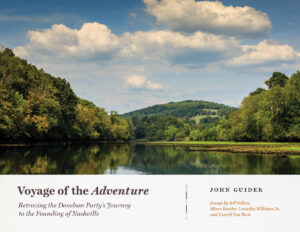Price: $34.95
Voyage of the Adventure

Voyage of the Adventure
Retracing the Donelson Party’s Journey to the Founding of Nashville
by John Guider | With essays by Jeff Sellers, Learotha Williams Jr., Albert Bender, and Carroll Van West
In the harsh winter of 1779, John Donelson loaded his family and thirty slaves into a forty-foot flatboat at the present site of Kingsport, Tennessee. Their journey into the wilderness led to the founding of a settlement now known as Nashville—over one thousand river miles away. In the fall of 2016, photographer John Guider retraced the Donelson party’s journey in his hand-built 14½’ motorless rowing sailboat while making a visual documentation of the river as it currently exists 240 years later.
This photo book contains more than 120 striking images from the course of the journey, allowing the reader to see how much has changed and how much has remained untouched in the two and a half centuries since Donelson first took to the water. Equally significant, the essays include long-ignored contemporary histories of both the Cherokee whom Donelson encountered and the slaves he brought with him, some of whom did not survive the journey.
Guider, a professional photographer, has created images of every point in the thousand-mile trip from a platform just a few feet above the waterline of three of Tennessee’s most notable rivers.
This is an angle on Tennessee’s history that is rarely seen or taught. Although we are, thank goodness, currently in a phase when many—or at least some vocal thinkers—question just how great the ‘great men’ of local history really were and hold their actions under a critical microlocal microscope, we still rarely venture into truly considering the experiences of the scope, lesser known or marginalized people of Tennessee’s past. Discussion of the ripple effects of past actions on the present landscape rarely ventures beyond politics or the broadest strokes of race relations. This book lives fully in that space.”
– Nina Cardona, WPLN, Nashville Public RadioWPLN, Radio